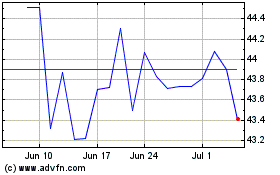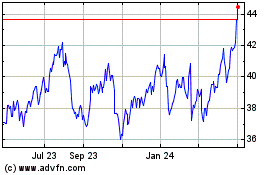HSBC Loss Grows To $4.23 Billion; Buybacks Boosted -- WSJ
February 22 2017 - 3:02AM
Dow Jones News
By Margot Patrick
HSBC Holdings PLC reported unexpectedly weak fourth-quarter
results and said shifting attitudes toward globalization could
affect its business.
Executives at the bank said Tuesday that a changed U.S. stance
on global trade, the rise of populism in Europe and Britain's
planned exit from the European Union have added uncertainty in
HSBC's key markets. They gave a mixed outlook for 2017, saying
rising interest rates will help it in the medium term but that
revenue in the U.K. and emerging markets is being dented by a
strong dollar.
HSBC's fourth-quarter earnings fell short of analyst
expectations because of a series of charges, but also reflected
margin pressures in some businesses.
Its net loss widened to $4.23 billion in the three months to the
end of December from $1.33 billion in 2015's fourth quarter.
Full-year net profit sank to $2.48 billion from $13.52 billion.
HSBC's shares fell 6.5%, to GBP6.66 ($8.30) in London. The stock
has gained about 50% in a year, mainly on hopes that future U.S.
interest-rate rises would lift margins and revenue.
Chief Executive Stuart Gulliver said political change could
shift global trade into regional blocs, while predicting London
will remain the dominant financial center in the region even after
some business relocates to the EU because of Brexit. HSBC repeated
its plans to move about 1,000 jobs to Paris in the next two
years.
There was some good news for investors. HSBC said it would buy
back as much as $1 billion in shares, adding to $2.5 billion bought
back last year, and left the door open for further buybacks as
capital is freed up at its U.S. business this year. The bank is
among the most strongly capitalized in Europe.
HSBC has undergone a major restructuring since 2011 under the
leadership of Mr. Gulliver and Chairman Douglas Flint, exiting from
most of Latin America and placing more focus on Asia. Mr. Flint is
set to step down after a successor is announced this year, and then
the new chairman will seek a successor to Mr. Gulliver. Mr.
Gulliver said Tuesday that Mr. Flint might not depart until
2018.
HSBC's struggles to get on top of its financial crime-fighting
systems continued. It spent $1.6 billion on implementing global
standards -- anti-money-laundering systems and controls used across
the bank -- but the monitor overseeing its compliance with a 2012
U.S. legal settlement found continuing deficiencies.
HSBC agreed to pay $1.9 billion in 2012 to settle allegations by
the U.S. Justice Department that it failed to catch money
laundering and violated sanctions. The bank admitted to the
failings and entered a five-year deferred prosecution
agreement.
Mr. Gulliver said the monitor identified some potential failings
in its U.K. anti-money-laundering controls at the end of 2016,
causing the U.K. financial regulator to order a fresh review.
--Joanne Chiu contributed to this article.
Write to Margot Patrick at margot.patrick@wsj.com
(END) Dow Jones Newswires
February 22, 2017 02:47 ET (07:47 GMT)
Copyright (c) 2017 Dow Jones & Company, Inc.
HSBC (NYSE:HSBC)
Historical Stock Chart
From Mar 2024 to Apr 2024

HSBC (NYSE:HSBC)
Historical Stock Chart
From Apr 2023 to Apr 2024
